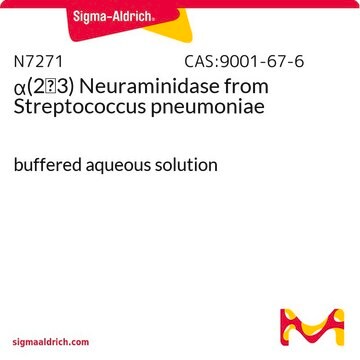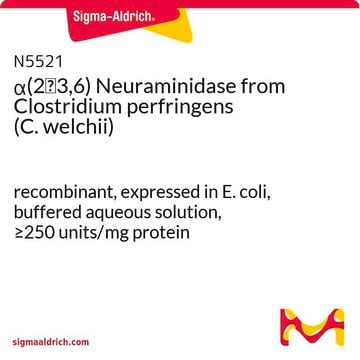MAK121
Neuraminidase Activity Assay Kit
sufficient for 100 colorimetric or fluorometric tests
Synonym(s):
Sialidase Activity Assay Kit
Sign Into View Organizational & Contract Pricing
All Photos(1)
About This Item
UNSPSC Code:
12161503
NACRES:
NA.84
Recommended Products
usage
sufficient for 100 colorimetric or fluorometric tests
application(s)
pharmaceutical
detection method
colorimetric
fluorometric
shipped in
dry ice
storage temp.
−20°C
General description
Neuraminidase, also known as Sialidase, is an enzyme that hydrolyzes terminal sialic acid residues on poly-saccharide chains. It is predominantly expressed in microorganisms such as bacteria and viruses. Cleavage of sialic acid residues by neuraminidase is believed to play several roles in infection by influenza viruses. It is thought to assist in the penetration of mucosal linings, the invasion of target cells, the elution of progeny viruses from infected cells, and the prevention of self-aggregation. Thus, neuraminidase is an important target for influenza drug development and simple, direct, and automation-ready procedures for measuring neuraminidase activity find wide applications in research and drug discovery.
Application
- 5-Nitrobenzo[c][1, 2, 5]selenadiazole as therapeutic agents in the regulation of oxidative stress and inflammation induced by influenza A(H1N1)pdm09 in vitro and in vivo.: This research utilized the Neuraminidase Activity Assay Kit to explore therapeutic agents that regulate oxidative stress and inflammation, showcasing its crucial role in antiviral research and potential pharmacological applications (Guo et al., 2023).
- Potency of bacterial sialidase Clostridium perfringens as antiviral of Newcastle disease infections using embryonated chicken egg in ovo model.: Highlights the kit′s use to measure and observe sialidase enzyme activity to assess the antiviral potential of bacterial enzymes against poultry diseases, contributing to the development of novel biocontrol methods (Kurnia et al., 2022).
- Molecular Docking Studies and Biological Evaluation of Berberine-Benzothiazole Derivatives as an Anti-Influenza Agent via Blocking of Neuraminidase.: Utilizes neuraminidase assay kit to evaluate the efficacy of synthesized compound′s neuraminidase activity, offering a path towards the design of new antiviral drugs with enhanced specificity and potency (Kumar et al., 2021).
Features and Benefits
Compatible with high-throughput handling systems.
Suitability
Suitable for the detection of neuraminidase activity in biological samples and for the screening of neuraminidase inhibitors.
Principle
In this assay, neuraminidase activity is determined by an enzymatic assay in which sialic acid released by neuraminidase results in a colorimetric (570 nm)/fluorometric (λex = 530/λem = 585 nm) product directly proportional to neuraminidase activity in the sample. The linear detection range at 37 °C is 0.1-10 units/L for colorimetric assays and 0.01-2 units/L for fluorometric assays.
Signal Word
Danger
Hazard Statements
Precautionary Statements
Hazard Classifications
Resp. Sens. 1 - Skin Sens. 1
Storage Class Code
10 - Combustible liquids
Certificates of Analysis (COA)
Search for Certificates of Analysis (COA) by entering the products Lot/Batch Number. Lot and Batch Numbers can be found on a product’s label following the words ‘Lot’ or ‘Batch’.
Already Own This Product?
Find documentation for the products that you have recently purchased in the Document Library.
Customers Also Viewed
Laura R Kuck et al.
Vaccine, 36(21), 2937-2945 (2018-04-28)
Practical methods to measure the potency of influenza vaccines are needed as alternatives for the standard single radial immunodiffusion (SRID) assay. VaxArray assays for influenza hemagglutinin (HA) and neuraminidase (NA) have been developed to address this need. In this report
Ryan Septa Kurnia et al.
Journal of advanced veterinary and animal research, 9(2), 335-345 (2022-07-28)
The Newcastle disease virus (NDV) is an infectious disease that causes very high economic losses due to decreased livestock production and poultry deaths. The vaccine's ineffectiveness due to mutation of the genetic structure of the virus impacts obstacles in controlling
Alfred T Harding et al.
mBio, 8(3) (2017-06-08)
Influenza virus vaccine production is currently limited by the ability to grow circulating human strains in chicken eggs or in cell culture. To facilitate cost-effective growth, vaccine strains are serially passaged under production conditions, which frequently results in mutations of
Irene Gómez Delgado et al.
Frontiers in immunology, 12, 641656-641656 (2021-03-30)
Haemolytic Uraemic Syndrome associated with Streptococcus pneumoniae infections (SP-HUS) is a clinically well-known entity that generally affects infants, and could have a worse prognosis than HUS associated to E. coli infections. It has been assumed that complement genetic variants associated
Aurora Salamanca et al.
Antiviral chemistry & chemotherapy, 29, 20402066211063391-20402066211063391 (2021-11-30)
Seasonal flu is caused by influenza infection, a virus that spreads easily in human population with periodical epidemic outbreaks. The high mutational rate of influenza viruses leads to the emergence of strains resistant to the current treatments. Due to that
Our team of scientists has experience in all areas of research including Life Science, Material Science, Chemical Synthesis, Chromatography, Analytical and many others.
Contact Technical Service










